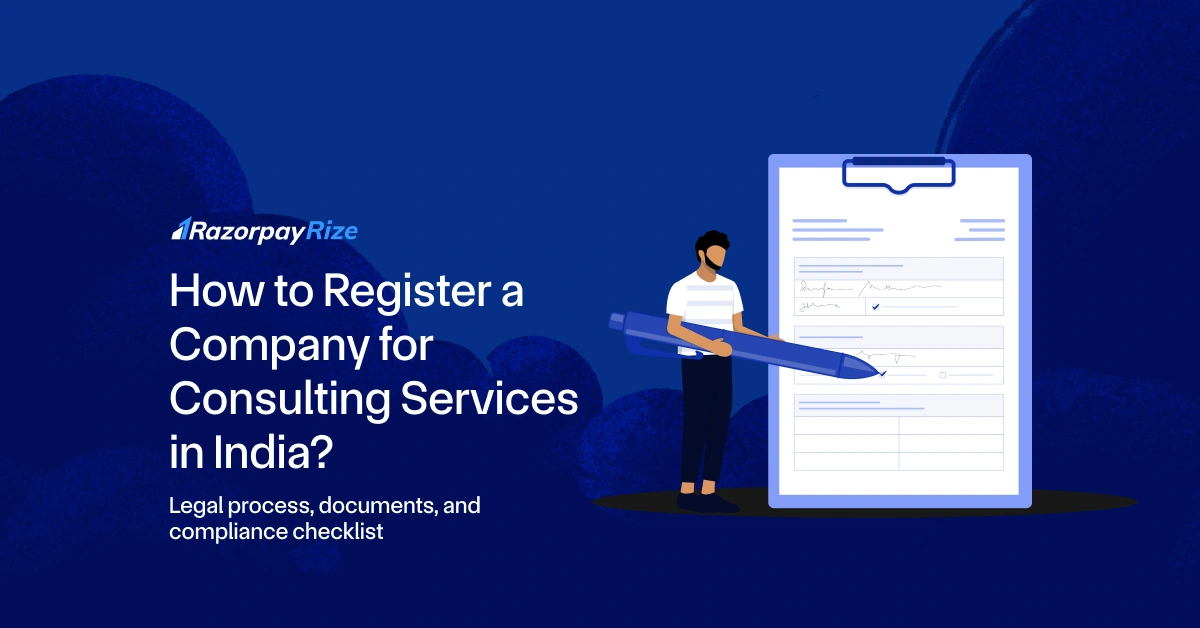The consulting industry in India is booming for good reasons. As markets become more competitive and technology reshapes how we do business, companies are looking for specialists who can provide fresh perspectives, solve complex challenges, and help them grow faster. From early-stage startups trying to find product–market fit to large corporations aiming to improve efficiency, the demand for expert advice is higher than ever.
Consulting can be a highly rewarding career path if you have deep knowledge in a field, whether it’s finance, management, marketing, IT, or legal.
In this guide, we’ll explore the different types of consulting you can offer and provide a step-by-step process for registering your consulting company in India so you can focus on delivering value while your business stands on solid legal ground.
Table of Contents
Types of Consulting
Consulting services span multiple domains, each catering to a unique set of client needs. Here are some popular types of consulting and what they typically involve:
Financial Consulting
Financial consultants help individuals and organisations manage money more effectively. Services may include investment planning, tax optimisation, budgeting, cash flow management, and economic risk assessment. Clients often include SMEs, startups, large corporations, and even high-net-worth individuals.
Management Consulting
Management consultants focus on improving business performance and solving operational challenges. They analyse existing processes, identify inefficiencies, and recommend strategies to improve productivity and profitability. Clients are usually companies undergoing restructuring, scaling, or entering new markets.
Marketing Consulting
Marketing consultants help businesses create and execute strategies to attract, engage, and retain customers. Services include brand positioning, campaign planning, market research, and digital marketing strategy. Their clients range from small businesses to large enterprises looking to strengthen their market presence.
IT Consulting
IT consultants advise on technology adoption, infrastructure setup, software implementation, and cybersecurity. They work with businesses looking to upgrade systems, integrate digital tools, or protect against cyber threats. Common clients include startups, tech companies, and corporations undergoing digital transformation.
Legal Consulting
Legal consultants provide guidance on compliance, contracts, dispute resolution, and regulatory matters. They help businesses avoid legal risks and ensure operations are aligned with applicable laws. Their clients often include startups, corporates, NGOs, and individuals requiring legal clarity.
Legal Steps to Register Your Consulting Business
Starting a consulting business in India requires following specific legal procedures under the Companies Act, 2013. While you can set up as a sole proprietorship, registering as a Private Limited Company or LLP offers more credibility and growth opportunities.
Here’s a step-by-step breakdown of the company registration process:
Step 1: Get in Touch with an Expert
Engage a Chartered Accountant (CA), Company Secretary (CS), or a reliable online platform that specialises in company registration. They can guide you through choosing the right business structure, preparing documents, and ensuring compliance.
Step 2: Share the Information and Required Documents
Provide details such as your proposed company name, nature of business, registered office address, and personal KYC documents for all directors or partners. This typically includes PAN, Aadhaar, address proof, passport-sized photos, and, in some cases, bank statements.
Step 3: Obtaining the DSC of Directors
A Digital Signature Certificate (DSC) is mandatory for directors to sign and submit forms electronically on the Ministry of Corporate Affairs (MCA) portal. Each director must have their own DSC issued by a government-approved agency.
Step 4: Applying for Company Name Reservation
File an application through the MCA’s RUN (Reserve Unique Name) service or as part of the SPICe+ form. Choose a name that reflects your consulting services, complies with MCA naming guidelines, and isn’t already in use.
Step 5: Creation of Mandatory Documents (MoA and AoA)
Draft the Memorandum of Association (MoA) and Articles of Association (AoA).
- The MoA defines your company’s objectives, including consulting services as your main activity.
- The AoA outlines your company’s internal rules and governance structure.
Step 6: Submitting the Application for Company Registration
Complete the incorporation process by filing the SPICe+ form along with all required documents on the MCA portal. Once approved, you’ll receive your Certificate of Incorporation (COI), along with PAN and TAN. You can then proceed to open a current bank account and commence operations.
Frequently Asked Questions (FAQs)
Private Limited Company
(Pvt. Ltd.)
- Service-based businesses
- Businesses looking to issue shares
- Businesses seeking investment through equity-based funding
Limited Liability Partnership
(LLP)
- Professional services
- Firms seeking any capital contribution from Partners
- Firms sharing resources with limited liability
One Person Company
(OPC)
- Freelancers, Small-scale businesses
- Businesses looking for minimal compliance
- Businesses looking for single-ownership
Private Limited Company
(Pvt. Ltd.)
- Service-based businesses
- Businesses looking to issue shares
- Businesses seeking investment through equity-based funding
One Person Company
(OPC)
- Freelancers, Small-scale businesses
- Businesses looking for minimal compliance
- Businesses looking for single-ownership
Private Limited Company
(Pvt. Ltd.)
- Service-based businesses
- Businesses looking to issue shares
- Businesses seeking investment through equity-based funding
Limited Liability Partnership
(LLP)
- Professional services
- Firms seeking any capital contribution from Partners
- Firms sharing resources with limited liability
Frequently Asked Questions
How to register a consulting company in India?
You can register a consulting company in India as a Private Limited Company, Limited Liability Partnership (LLP), or Partnership, depending on your goals.
Steps to register:
- Choose your business structure (Pvt Ltd, LLP, or Partnership)
- Get Digital Signature Certificates (DSCs) for all directors/partners
- Reserve a unique company name via the MCA portal (SPICe+ form)
- Draft the Memorandum of Association (MoA) & Articles of Association (AoA)
- File the incorporation form (SPICe+) with the Ministry of Corporate Affairs
- Obtain Certificate of Incorporation (COI) along with PAN and TAN
- Open a current bank account in the company’s name and start operations
If you prefer a quicker process without heavy compliance, LLP or Proprietorship can work, but for credibility and scalability, Private Limited Company is often the best choice.
How to start a job consultancy business in India?
A job consultancy connects job seekers with employers, helping companies find the right talent.
Steps to start:
- Decide your niche – IT hiring, executive search, entry-level recruitment, etc.
- Register your business – You can start as a Proprietorship, LLP, or Private Limited Company
- Apply for GST registration (mandatory if turnover exceeds ₹40 lakh or if operating interstate)
- Get a current account in your business name
Sign agreements with companies for recruitment services - Build a talent pool using job portals, LinkedIn, and direct applications
Ensure compliance with labour laws and data protection rules
How to register a service-based company in India?
A service-based company provides services instead of physical products — for example, consulting, marketing, IT services, event management, etc.
Steps to register:
- Select your business structure – Partnership, LLP, or Private Limited Company
- Obtain DSC
- Reserve the company name via MCA
- Draft MoA & AoA (for Pvt Ltd) or LLP Agreement (for LLP)
- File incorporation form with MCA
- Receive Certificate of Incorporation
Get PAN, TAN, and GST registration (if applicable)
















